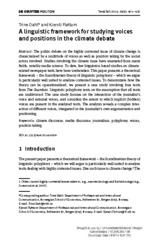A linguistic framework for studying voices and positions in the climate debate
Peer reviewed, Journal article
Published version

View/
Date
2014-07Metadata
Show full item recordCollections
Original version
https://doi.org/10.1515/text-2014-0009Abstract
The public debate on the highly contested issue of climate change is characterized by a multitude of voices as well as position taking by the social actors involved. Studies involving the climate issue have emanated from many fields, notably media science. To date, few linguistics-based studies on climate-related newspaper texts have been undertaken. This paper presents a theoretical framework – the Scandinavian theory of linguistic polyphony – which we argue is particularly well suited to analyze contested issues. To demonstrate how the theory can be operationalized, we present a case study involving four texts from The Guardian. Linguistic polyphony rests on the assumption that all texts are multivoiced. The case study focuses on the interaction of the journalist’s voice and external voices, and considers the extent to which implicit (hidden) voices are present in the analyzed texts. The analysis reveals a complex interaction of different voices, integrated in the journalist’s own argumentation and positioning.